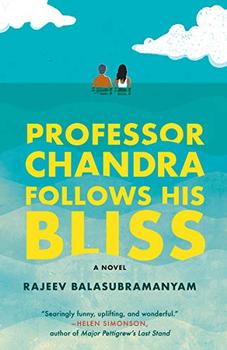Summary | Excerpt | Reviews | Beyond the Book | Readalikes | Genres & Themes | Author Bio

Chapter 1
It should have been the greatest day of his life. His youngest daughter, Jasmine, had flown from Colorado to share in his triumph. There had been pieces in the Financial Times and the Wall Street Journal which were all but premature celebrations: "Like Usain Bolt in the hundred," the former read, "like Mrs. Clinton in November, this is one front-runner who cannot lose." The Academy were famous for their secrecy, their cloak-and-dagger strategies to stave off leaks, but this time even the bookies agreed—the Nobel Prize in Economics 2016 belonged to Professor Chandra.
He did not sleep that night, only lay in bed imagining how he would celebrate. There would be interviews, of course, CNN, BBC, Sky, after which he would take Jasmine out for an early brunch before her flight, perhaps allowing her a glass or two of champagne. By evening the college would have organized a function somewhere in Cambridge. His competitors would be there, all the naysayers and backstabbers and mediocrities, but Chandra would be magnanimous. He would explain how the million-dollar check and the banquet in December with the King of Sweden meant nothing to him. His real joy lay in being able to repay the faith shown by his departed parents, trusted colleagues, and his old mentor, Milton Friedman, who had once helped him change his tire in the snow in the days when Chandra was still a lowly Associate Professor.
By midmorning he had rehearsed his victory speech a dozen times. Still in his dressing gown, he brought a cup of coffee to his bedroom and placed it by the telephone before stretching out on the bed, his hands behind his head, in anticipation of the call. An hour later his daughter entered to find him snoring on top of the covers.
"Dad, wake up," said Jasmine, shaking his foot. "Dad, you didn't get it."
Chandra did not move. He had waited so long for this, suffered through so much; his BA at Hyderabad, his PhD at Cambridge, his first job at the LSE, that punishing decade at Chicago and, after his return to Cambridge, the crash of 2008, the instant vilification of his tribe, the doubts, the pies in face, and every year afterward the knowledge that though his name had been on the committee's longlist in April and their shortlist in the summer, that 18-carat-gold medal had still ended up in someone else's fist. This was the year his ordeal was supposed to end, the year that should have made it all worthwhile.
"And who, may I ask, was the lucky recipient this time?"
"There were two of them," said Jasmine.
Chandra jerked his body erect, shoved two pillows behind his back, his reading glasses onto his nose.
"Names?"
"Can't remember."
"Try."
"Heart and Stroganoff, something like that."
Chandra groaned. "Not Hart and Holmström?"
"Yeah. I think so."
"So who will it be next year? Starsky and Hutch?"
"I don't know, Dad. Maybe."
"Well, that's that, then," he said, pulling the covers over his body and realizing that, were it not for his daughter, he would probably remain in that position until next year.
Ten minutes later Jasmine returned to tell him that a group of journalists were outside the house. Chandra met them, still in his dressing gown, and politely answered their questions. It was his daughter's idea to invite them in for coffee, which meant he ended up sitting at his kitchen table with four members of the local press: one from the Grantchester Gazette, one from the Anglia Post, and two from the Cambs Times.
"We're so sorry, sir," said a young woman from the Gazette, who appeared close to tears.
"It was yours," said the man from the Times, who smelled of gin. "We were hoping for a fine party tonight."
"Well, now, now," he replied, touched by their kindness. "C'est la vie."
"It should have been you, sir," said the woman. "It simply should have been you."
Excerpted from Professor Chandra Follows His Bliss by Rajeev Balasubramanyam. Copyright © 2019 by Rajeev Balasubramanyam. All rights reserved. No part of this excerpt may be reproduced or reprinted without permission in writing from the publisher.
The only real blind person at Christmas-time is he who has not Christmas in his heart.
Click Here to find out who said this, as well as discovering other famous literary quotes!
Your guide toexceptional books
BookBrowse seeks out and recommends the best in contemporary fiction and nonfiction—books that not only engage and entertain but also deepen our understanding of ourselves and the world around us.